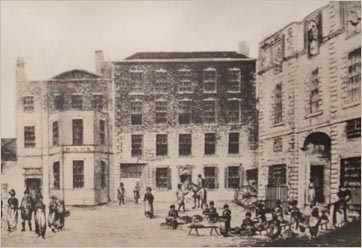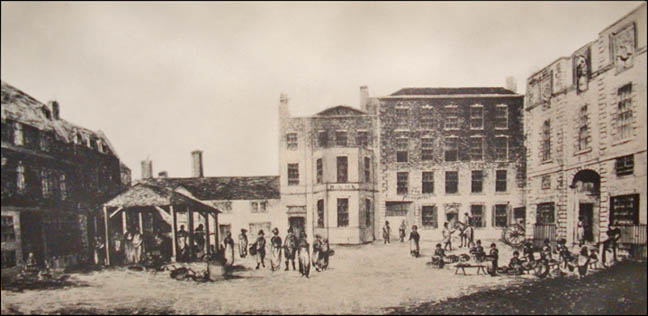The White Lion Hotel, which stood for centuries on the west side of the Market
Square, an area long known as The Fish Market, where the entrance to the Forum shopping precinct
is now, was Chester's foremost and, by the standards of the day, most luxurious,
coaching inn. Stages long departed from its door to London, Ireland and all parts of the kingdom.
Its landlord in 1605 had been William Pugh. Later came William Higginson, whose will in 1726 left it to his wife Elizabeth. The Higginsons of Chester were connected with the brewing and retailing of beer within the city for more than a century. Later, the Smith family long dominated. George Smith (see below) developed the coaching services and his sons William and Daniel, each in turn landlords of the White Lion, served as Sheriff of Chester in 1740 and 1765 respectively. A Mr Ellis was the licencee in 1781- as, it seems, was one J Hart. It is listed in Cowdroy's Directory in 1782, its licencee then being John Paul. Thomas Austin was the licencee in 1807 (see below), in 1817 it was Mercy Tomlinson (who would take over the Feathers Inn in Bridge Street in 1822), in 1850 Thomas Howell and in 1855-7 Peter Hilton. The venerable White Lion is absent from subsequent directories- unsurprisingly, as the splendid, and still much-missed, Market Hall was built on its site in 1863.
Returning briefly to Mr George Smith, the Lion's 18th century landlord and coach promoter. When he died, he was laid in a lead coffin and buried in in the churchyard of St. Oswald's Parish Church, now the south transept of Chester Cathedral, just minutes away from to his old home and business. There he rested for half a century or so until, as the Churchwarden's records show: "1806. Oct, 5. At a Vestry Meeting held this day, for the purpose of Investigating and enquiring into the taking of and concealing a leaden coffin out of the Burying Ground of the late Mr. Geo. Smith, and the same having been cut up and conceal'd in the Belfrey, the following is the resolution of this Vestry: that the Churchwardens apply to Mr. Thos. Fluitt, for the purpose of investigating the matter more fully".
Two days later, "at a Vestry Meeting held this 7th day of October, 1806, It is resolved, that a prosecution shall be commenced and prosecuted against such person or persons who may be suspected of taking away the lead coffin from the Burying Ground of Mr. Smith; and that such prosecution shall be carried on by Mr. Flutt at the expense of the parish."
Various expenses were subsequently recorded, dealing with such matters as, "removing the gravestone, sinking the grave, removing the Corps out of the grave, fixing, filling up, &c", "paying Constables for looking after the two lads who had stolen the lead coffin", paying "a man and boy for loss of time in waiting of Sessions, to give evidence against the Lads, and for boy carrying the Lead to Court, and one of the lads convicted" and "paying Mr. Flewitt's the Attorney's Bill for Prosecution".
What eventually became of poor George's body and the punishments handed down to the youthful grave robbers are facts, unfortunately, not recorded.
Our picture shows The White Lion standing next to The Exchange, Chester's first purpose-built Town Hall, which stood in the Market Square between 1695 and 1862, in which year it was destroyed by fire.
This letter was written by landlord Thomas Austin, dated May 2nd, 1807: "Having had the honour of serving the family, take the liberty of offering my services, and can say that no House in the Kingdom can execute a Black Job in a better stile or on more reasonable terms. A preference will oblige, Sir, Your Obed. H'ble Ser't. Tho's Austin, Lyon Inn."
A 'Black Job' was a local term connected with the undertaking business.
The coming of the railway brought about the decine of the old coaching inns and, in 1856, Chester author and guide Thomas Hughes, who remembered the place in its heyday, recalled that it had been, "always full of the right sort of visitors, and seldom was a stall vacant in the immense stabling at the rear... Times are changed now; every dog has his day and doubtless every Lion too: at all events, our White Lion is neither so brisk nor so vigorous as he was of yore. The present worthy landlord is himself a retired whip, and as he rambles up and down through those noble rooms, once swarming with company, must often, we fear, look back gloomily upon the past".
 The proprietors of the Cambrian Brewery, Wrexham bought the White Lion in 1840 and promptly evicted the tenant Thomas Whaley. They advertised the house as to be let (Chester Chronicle: 17th July 1840): The proprietors of the Cambrian Brewery, Wrexham bought the White Lion in 1840 and promptly evicted the tenant Thomas Whaley. They advertised the house as to be let (Chester Chronicle: 17th July 1840):
"White Lion Hotel Posting House, Chester. TO BE LET, with possession, on the 1st day of January next, that very Old Established and highly respectably accustomed HOTEL, replete with every convenience for the comfort and accommodation of families, having numerous sitting and bed rooms, extensive Stabling, Lock-up Coach-houses, &c. situated in Northgate-street, nearly central of the city of Chester, called the WHITE LION HOTEL, and now in the occupation of Mr. Thomas Whaley. For particulars apply to Messrs. CLARK & ORFORD, Cambrian Brewery, Wrexham".
Whaley responded with an announcement in the next issue of the Chester Chronicle (24th July 1840):
"White Lion Hotel, Chester. THOMAS WHALEY most gratefully acknowledges the very great patronage he has experienced since he entered on the above Hotel; and respectfully informs the public, that though he has received “notice to quit,” and the house, &c. is advertised to be let, he hopes to be able to open an equally commodious, if not superior Hotel, and he has no doubt that the public’s support will be continued to him.
T. W. also takes this opportunity to state, that why and wherefore his tenancy of the above Hotel is to be terminated, he does not profess to explain, as he has always paid the rent punctually, and fulfilled all the duties of a tenant; but as in the advertisement notifying that it is to be Let, reference is given to Messrs. Clark and Orford, public brewers and spirit dealers, the public no doubt will readily understand, and probably appreciate the cause, particularly as T.W. has always vended wine, spirits, and malt liquor, of unimpeachable quality, which it would not have been in his power to do, if he had suffered himself to be tied to any monopolising firm".
Mr Whaley then took over the Albion Hotel in Lower Bridge Street. It is not known for how long the Cambrian Brewery owned the White Lion.
Another White Lion Hotel used to trade in Foregate Street. Learn about it here... |

 The proprietors of the Cambrian Brewery, Wrexham bought the White Lion in 1840 and promptly evicted the tenant Thomas Whaley. They advertised the house as to be let (Chester Chronicle: 17th July 1840):
The proprietors of the Cambrian Brewery, Wrexham bought the White Lion in 1840 and promptly evicted the tenant Thomas Whaley. They advertised the house as to be let (Chester Chronicle: 17th July 1840):